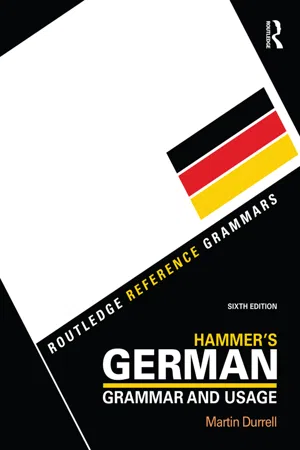Languages & Linguistics
Personal Pronouns
Personal pronouns are words used to replace nouns in a sentence to avoid repetition. They refer to individuals or groups and include words like "I," "you," "he," "she," "it," "we," and "they." Personal pronouns can vary based on person, number, gender, and case, and are essential for clear and concise communication in language.
Written by Perlego with AI-assistance
Related key terms
1 of 5
11 Key excerpts on "Personal Pronouns"
- eBook - PDF
- Heidrun Dorgeloh, Anja Wanner, Heidrun Dorgeloh, Anja Wanner(Authors)
- 2010(Publication Date)
- De Gruyter Mouton(Publisher)
In lan- guage acquisition, gaining an understanding of pronouns as contextual pointers that may shift their reference with every turn of a conversation comes relatively late in the development of children (around age three, according to Wales 1996). Pronoun systems show significant variation across languages and dialects, e.g. by marking inclusive and exclusive pronominality, dual and trial number, social deixis and other categories that English does not explicitly indicate. The pronoun paradigm below reflects only standard Modern English and omits non-standard varieties, many of which morphologically encode more grammatical informa- tion than the standard permits (e.g. American English y’all marking plural on the second person; see also Heyd, this volume). Table 3. Personal Pronouns in standard Modern English Singular Plural Subject Object Reflexive Subject Object Reflexive First I me myself we us ourselves Second You you yourself you you yourselves Third Masculine He him himself they them themselves Feminine She her herself Neuter It it itself While the term pronoun suggests that they stand in for nouns, this needs qualifi- cation. Most pronouns can be used either deictically or endophorically, and in the latter case the pronoun effectively replaces the entire noun phrase, a form of prag- matic economy that “enhances communicative efficiency by avoiding needless repetition” (Langacker 1987: 490). When used deictically, however, a pronoun does not replace anything, rather, it is usually the default referring expression. Thus while Cornelius Puschmann and I would semantically be coreferential when used by me, both the full nominal and the third person pronoun would be highly marked if I were to use them to refer to myself in actual discourse. - eBook - PDF
- Martin Durrell(Author)
- 2016(Publication Date)
- Routledge(Publisher)
3 Personal Pronouns P RONOUNS are a limited (‘closed’) set of small words which stand in place of N OUNS or N OUN PHRASES . In particular they stand for nouns or noun phrases which have already been mentioned or which are so well known to the speaker and the listener that they do not need to be repeated in full. Pronouns are used in the same grammatical contexts as nouns or noun phrases and thus, in German, they change their form to indicate the same grammatical categories as nouns, i.e. CASE , N UMBER and GEN DER . There are a number of different types of pronoun, and most of them are treated in Chapter 5 . This chapter explains the forms and uses of the PERSON AL PRONOUNS , i.e. those which refer to: • the speaker(s), i.e. English I and we – the FIRST PERSON • the person(s) addressed, i.e. English you – the SECON D PERSON • other person(s) or thing(s) mentioned, i.e. English he , she , it and they – the THIRD PERSON The Personal Pronouns have different forms to show plural, case and, in the third person, gender. These forms are given in Table 3.1 . TABLE 3.1 Personal Pronouns Person Nominative Accusative Genitive Dative Singular 1st ich I mich meiner mir 2nd du you dich deiner dir 3rd masculine er he/it ihn seiner ihm feminine sie she/it sie ihrer ihr neuter es it es seiner ihm Plural 1st wir we uns unser uns 2nd familiar ihr you euch euer euch polite (sg./pl.) Sie you Sie Ihrer Ihnen 3rd sie they sie ihrer ihnen This chapter gives information on: • the forms of the Personal Pronouns (section 3.1 ) • reflexive and reciprocal pronouns (section 3.2 ) • the use of the second person pronouns du , ihr and Sie (section 3.3 ) • the uses of the third person pronouns (section 3.4 ) • the prepositional adverb (section 3.5 ) • special uses of the pronoun es (section 3.6 ) 60 Personal Pronouns 3.1 The forms of the Personal Pronouns 3.1.1 The declension of the Personal Pronouns The forms of the Personal Pronouns given in Table 3.1 are those which are the norm in writing. - eBook - PDF
- Eleanor Dozier, Zulma Iguina(Authors)
- 2016(Publication Date)
- Cengage Learning EMEA(Publisher)
A Personal Pronouns B Se C Demonstrative and Possessive Pronouns D Interrogatives E Exclamatives F Indefinites and Negatives G Relative Pronouns Pronouns CHAPTER 3 Copyright 201 7 Cengage Learning. All Rights Reserved. May not be copied, scanned, or duplicated, in whole or in part. Due to electronic rights, some third party content may be suppressed from the eBook and/or eChapter(s). Editorial review has deemed that any suppressed content does not materially affect the overall learning experience. Cengage Learning reserves the right to remove additional content at any time if subsequent rights restrictions require it. 50 Chapter 3 ■ Pronouns A Personal Pronouns Personal Pronouns are differentiated by their grammatical function: subject, object (direct, indirect, prepositional), and by their stress: stressed or unstressed. They may refer to first person ( yo, me, mí; nosotros/as, nos ), second person ( tú, te, ti; usted, le; ustedes, les; vosotros/as, os ), or third person ( él/ella/ellos/ellas, lo/la/le/se/ sí, los/las/les/se/sí ). 1 Grammatical Functions of Personal Pronouns a. Subject The subject carries out the action of the verb. The verb of a sentence may suffice in and of itself to express everything that we need to say about the subject, with no additional complements: María llegó. María arrived. Pepa salió. Pepa went out. Nosotros pagamos. We paid. Ella ya jugó. She already played. b. Direct object complement A direct object complement specifies who or what receives the action of the verb directly. It may be a person, an animal, or a thing: [subj. 1 : yo; d.o.: las noticias / las ]: Oí las noticias. I heard the news. Las oí. I heard them. [subj.: nosotros; d.o.: la película / la ]: Vimos la película. We saw the movie. La vimos. We saw it. [subj.: yo; d.o.: tu hermana / la ]: Vi a 2 tu hermana. I saw your sister. La vi. I saw her. 1 The subject pronoun in Spanish is used mostly for emphasis or clarification. - eBook - PDF
- Alice R. Gaby(Author)
- 2017(Publication Date)
- De Gruyter Mouton(Publisher)
5 Pronouns, ignoratives and demonstratives 5.1 Pronouns Pronouns may be divided roughly into two groups; those that inflect for case and those that do not. Personal Pronouns comprise the first category, and take the form of both free pronouns and reduced enclitics. The uninflecting pronouns fall into three categories: reflexive pronouns, emphatic pronouns and inclusory pronouns. The rela-tionships between the various categories of pronoun are represented in Figure 11. Pronouns +case Personal Pronouns -case free enclitic reflexive emphatic inclusory Figure 11. Relationships between categories of pronoun. 5.1.1 Personal Pronouns 5.1.1.1 Morphology of free Personal Pronouns The Kuuk Thaayorre paradigm of Personal Pronouns distinguishes three persons (first, second and third), three numbers (singular, dual and plural) and maintains an inclusive/exclusive distinction for non-singular first person pronouns. As mentioned in §4.1, pronouns exhibit a syncretism of nominative and ergative cases, with distinct accusative case forms. The unmarked (nominative and ergative) forms of all the per-sonal pronouns are as follows: Table 35. Nominative (= ergative) Personal Pronouns. 98 1 st Person 2nd Person 3rd Person singular ngay nhunt nhul dual ngal (inclusive)98 ngali (exclusive) nhip pul plural ngamp (inclusive) ngancn (exclusive) nhurr peln 98 There is no a priori reason why inclusive pronouns such as ngal ‘you and I’ should be classified first rather than second person, since they refer to both the speaker and addressee. My motivations for Pronouns 153 The following three tables present the full, case-inflected paradigms of personal pro-nouns, sorted according to person. - eBook - PDF
- Manuel Widmer(Author)
- 2017(Publication Date)
- De Gruyter Mouton(Publisher)
The chapter is structured in the following manner: In Section 5.2, I give an over-view of the different types of pronouns. In Section 5.3, I discuss the different types of demonstratives that are attested in my data. Note that I follow Diessel (1999: 74) in including demonstrative adverbs of location, manner, quantity and quality in my description of demonstrative expressions. 5.2 Pronouns 5.2.1 Personal Pronouns Personal Pronouns are a closed lexical class of words that can substitute for nouns or noun phrases that refer to human beings or, more generally, entities that are con-ceptualized as human-like, i.e., supernatural beings such as gods, demons, and talking animals. Personal Pronouns additionally indicate the speech act role of the substituted referent, i.e., speaker (first person), addressee (second person), or non-participant (third person). All Personal Pronouns can be marked for plural reference with the plural clitic =ɕi . Dual forms are formed periphrastically by postposing the numeral nispi ‘two (human)’ after a pronoun. However, the expression of duality is not obligatory, and it is perfectly possible to use a plural form to refer to a group of two persons. 246 Pronouns and demonstratives The first person singular pronoun is gi . In the first person plural, there is a dis-tinction between an inclusive form er a ŋ and an exclusive form hiŋ . The inclusive form comprises the speaker and the addressee and may include further non-speech act participants as well. The exclusive form refers to the speaker and non-speech act participants, but explicitly excludes the addressee. When standing in the absolu-tive case, er a ŋ and hiŋ can be optionally marked with the plural clitic =ɕi , while they obligatorily have to take the plural marker =tsʰi (instead of =dzi ) when being marked for ergative case. The genitive forms of er a ŋ and hiŋ have the irregular shape erĩː and hĩː. Table 48 gives an overview of first person pronoun forms. - eBook - PDF
- Claire Bowern(Author)
- 2012(Publication Date)
- De Gruyter Mouton(Publisher)
They mark focus and topic status, for example, but are seldom used in reference tracking. Bowern (2008a) provides some earlier discussion, and these func-tions are described below. 286 Pronouns and Demonstratives 1. Personal Pronouns The evidence for pronouns as a word class distinct from nouns is not par-ticularly strong. They do not show case marking paradigms distinct from nouns, for example. Their behavior in discourse shows properties of both nouns and pronouns, since most reference tracking is done with agreement or null anaphora rather than overt pronouns. They can take modifiers, just as nouns do (see § 7.1.6). Like pronouns in other languages, however, they get their reference from the discourse context. Third person pronouns are also quite extensively used as determiners and modifiers of nouns. Person pronouns also have inherent number specification, whereas nouns in Bardi do not. The free pronouns are also inherently referential, unlike nouns, and unlike agreement markers. Therefore while I treat Personal Pronouns as a dis-tinct class here, one should remember that there are no morphological (and few syntactic) differences between nouns and pronouns. 1.1. Number distinctions in Personal Pronouns The Nyulnyulan languages (including Bardi) and many other non-Pama-Nyungan languages of the Kimberley region are described as having a four-person minimal/augment system, an analysis due to McGregor (1989a). Mc-Gregor (1989a) and Rumsey (1996) noticed several unusual facts about the pronominal systems of languages like Nyulnyul and Gooniyandi. These lan-guages have (in familiar terminology) a first person dual inclusive pronoun, but no first person dual exclusive. The first person dual exclusive is marked by the first person plural. In many of the relevant languages there is no second or third person dual. Secondly, the first person dual inclusive seems to pattern more with the ‘singular’ pronouns than with non-singular ones. - Angela Grimm, Anja Müller, Cornelia Hamann, Esther Ruigendijk, Angela Grimm, Anja Müller, Cornelia Hamann, Esther Ruigendijk(Authors)
- 2011(Publication Date)
- De Gruyter Mouton(Publisher)
Comprehension and imitated production of Personal Pronouns across languages Dagmar Bittner, Milena Kuehnast, and Natalia Gagarina 1 Introduction Across languages, little is known to what types of cues pre-school children refer when selecting and resolving pronouns across sentences and how they proceed to target use of these anaphoric means. Most studies on children’s use of pronouns investigate the knowledge of English-learning children. However, taking language-speci ¿ c factors seriously one has to be very careful in general-izing ¿ ndings on English across languages. The English Personal Pronouns he and she , for instance, refer to human beings only. The feature [+human] is part of their lexical meaning. In the same way it is speci ¿ ed for [-human]. These speci ¿ cations are not given with (personal) pronouns in many other languages. The Subject Preference Hypothesis (Frederiksen 1981) claims that the pre-ferred antecedent of an ambiguous pronoun is the grammatical subject of the preceding clause. Given that the subject of a transitive sentence prototypically presents the agent of the clause, correlation with the subject is likely to be much closer in pronouns restricted to human or even animate referents. Pronouns not restricted to animate referents can easily be shown to refer to non-subjects, cf. The forward i is missing the ball j . It j is slipping behind the line. There are several other aspects of language-speci ¿ c features which very likely affect the capacity of anaphora. One of them, for instance, is the number of referential expressions competing or overlapping in their anaphoric capacity ( cf. Gundel, Hedberg, and Zacharski 1993). The correlation of (personal) pronouns with subject/ topic reference is likely to be much closer in languages not exhibiting a null pronoun. Nevertheless, the personal pronoun (PERS) is a formally less complex anaphor and is used for topic continuation in many languages.- eBook - PDF
- Henrik Liljegren(Author)
- 2016(Publication Date)
- Language Science Press(Publisher)
6 Pronouns 6.1 Introduction and overview Palula is essentially a ‘two-person’ language (Bhat 2004: 4–15), having distinct first- and second-person (singular, plural) pronouns, i.e., for the speech act par- ticipants, whereas third person is expressed by forms belonging to the category of demonstratives. Third person displays a number of properties (such as distinc- tion in gender, distance and accessibility) not shared with the first- and second- person pronouns, but that are shared to a large extent with a larger category of pro-forms, which build a number of symmetrical sets that cut across several word classes. Personal Pronouns proper, other types of pronouns as well as demonstra- tives (pronominal and adnominal) and with them related forms are treated in this chapter. 6.2 Personal Pronouns The Personal Pronouns, 1sg, 2sg, 1pl and 2pl, occur in two to four case forms each, as displayed in Table 6.1. 1 While the singular persons make a two-way nominative-genitive distinction, the plural persons make a four-way distinction between nominative, accusative, genitive and ergative. That means that, whereas most nouns only distinguish between nominative and oblique case (beside the genitive forms), and the agent of transitive perfective clauses is expressed in the oblique, the plural Personal Pronouns have a unique ergative pronominal form; compare the ergative 1pl asím in example (2) with the nominative be and accusative asaám in example (1). 1 Throughout this work, the pronouns are glossed according to formal distinctions only. That means, 1sg ma and 2sg tu are glossed as nom regardless of their functions (as subjects, direct objects or postpositional objects, etc.), and 1sg míi and 2sg thíi are glossed as gen regardless of their functions (as heads of possessive constructions or subjects of perfective transitive clauses, etc.). - eBook - PDF
- Diana Forker(Author)
- 2013(Publication Date)
- De Gruyter Mouton(Publisher)
Chapter 5 Pronouns 5.1. Personal Pronouns The Personal Pronouns for speech act participants are given in Table 23 below. For the third person demonstrative pronouns are used (see Section 5.2). The per-sonal pronouns distinguish number (singular vs. plural) and can be in fl ected for case. But for semantic reasons they do not take the Instrumental case (see Sec-tion 3.5.6 for the use of the Instrumental). The case formation is straightforward; therefore, Table 23 gives only partial paradigms. Table 23. Personal Pronouns 1 SG ‘I’ 2 SG ‘you’ 1 PL ‘we’ 2 PL ‘you’ Absolutive de me eli meži Ergative de me eli meži First Genitive di debe eli / elu-s meži / mežu-s Second Genitive di-žo dew-zo elo / elu-zo mezo / mežu-zo Dative di-ž debe-z elu-z mežu-z SPR -Essive di-ň ’o dew-ň ’o elu-ň ’o mežu-ň ’o SUB -Essive di-ň debe-ň elu-ň mežu-ň AT -Ablative1 di-qos dew-qos elu-qos mežu-qos ALOC -Lative di-der dew-der elu-der mežu-der All four Personal Pronouns show the Absolutive-Ergative syncretism that also occurs in the East Tsezic languages Bezhta and Hunzib. 38 For the plu-ral pronouns the syncretism even includes the First Genitive. For all other case forms these pronouns have irregular oblique stems. The fi rst and second person plural pronouns have two variants for the First and Second Genitive, a morphologically regular form ( elus, eluzo, mežu-s, mežu-zo ) and a more idiosyncratic form ( eli, elo, meži, mezo ) which is more frequent. The fi rst person singular pronoun and the fi rst and second person plural pro-nouns have one oblique stem each that is used for all case forms except Absolu-tive and Ergative. These oblique stems are formed by changing the quality of the fi nal vowel (/e/ → /i/ for 1 SG and /i/ → /u/ for 1 PL , 2 PL ). 38 In contrast, the two West Tsezic languages Tsez and Khwarshi, which are more closely related to Hinuq than East Tsezic languages, distinguish Absolutive from Ergative: Khwarshi for all Personal Pronouns, and Tsez for plural pronouns. - eBook - PDF
Essentials of Mastering English
A Concise Grammar
- Carl Bache(Author)
- 2013(Publication Date)
- De Gruyter Mouton(Publisher)
208 Pronominals C) Emphatic autonomous use. Finally, reflexive pronouns are used non-reflexively and autonomously as emphatic alternatives to the Personal Pronouns - typically after prepositions (especially than, as, like, except and but) or when serving as a CJT in a compound unit: (20) No one knew this better than himself. (21) She's about the same age as myself. (22) Everybody except herself laughed at the joke. (23) That topic was connected with the terminal row between Sally and myself. The reflexive pronoun is here often used to avoid having to choose between the subjective and objective form of the personal pronoun {than he / than him, as 1/as me, etc.). 15.3. Pronouns without a person distinction 15.3.1. Demonstrative pronouns The demonstrative pronouns in English can be presented in terms of the two categories applying to them, number and deixis: distant singular plural this these that those To these four central demonstratives we can add the two locative adverbial demonstratives here and there. Demonstratives are emphatic in nature. They have both determinative and autonomous uses: (1) At that exact moment they were both indoors, (determinative) (2) In this way, the name acquired a quasi-official status, (determinative) (3) These couldn't be her children, (autonomous) (4) He counted those who were late, (autonomous) Demonstratives assume the usual range of external functions: S, Od, Oi, Cs, Co, CJT, and DEP of preposition. Here are some examples: (5) That's normal, isn't it? (S) Demonstrative pronouns 209 (6) Why am I telling you this! (Od) (7) I'm going to give those who failed me a little surprise. (Oi) (8) How did it ever come to this? (DEP of preposition) Elsewhere, demonstratives normally serve as determiners (as in that exact moment, this way, etc.). - eBook - PDF
Spoken Language Pragmatics
Analysis of Form-Function Relations
- Regina Weinert(Author)
- 2007(Publication Date)
- Continuum(Publisher)
With regard to Personal Pronouns in (20), they appear to be part of the scene-setting for the crucial topic - the problematic schein, a preamble. It would not, however, seem appropriate to see this use as evidence for the unmarked status of anaphoric Personal Pronouns per se. After all, 65 per cent of all masculine, feminine and plural pronouns in the academic consultations are demonstratives. The nature of pronoun/pro-form chains supports the view that demonstratives contribute centrally to discourse cohesion in the academic consultations. Two factors are therefore responsible for the role of demonstratives in the two data sets: one informational, one interpersonal. Without attempting a direct comparison with Biber (1990), we may borrow the labels for two textual dimensions he identified: involvement and on-line informational elabo-ration. Biber found that these two textual factors have a strong weighting of pronouns and demonstratives in English. On-line informational elaboration is characteristic of spontaneous, unplanned informational discourse which relies heavily on markers of discourse cohesion. Involvement means the inter-personal aspect of spoken language which demonstratives can serve to express. Both dimensions are present in both data sets. The conversations have a higher degree of involvement which is evident in the content, lexical choices and high frequency of modal and discourse particles. The academic consul-tations have a higher level of on-line informational elaboration, reflected in the higher frequency of demonstrative pronouns and discourse deictics. 3.5 Demonstratives and discourse cohesion Demonstrative masculine, feminine and plural pronouns play a central role in creating cohesive discourse and as such they fit into the larger picture of deixis in spoken German. We saw in 3.1 that neuter demonstrative das is a highly frequent discourse deictic occurring predominantly in clause-initial position.
Index pages curate the most relevant extracts from our library of academic textbooks. They’ve been created using an in-house natural language model (NLM), each adding context and meaning to key research topics.










